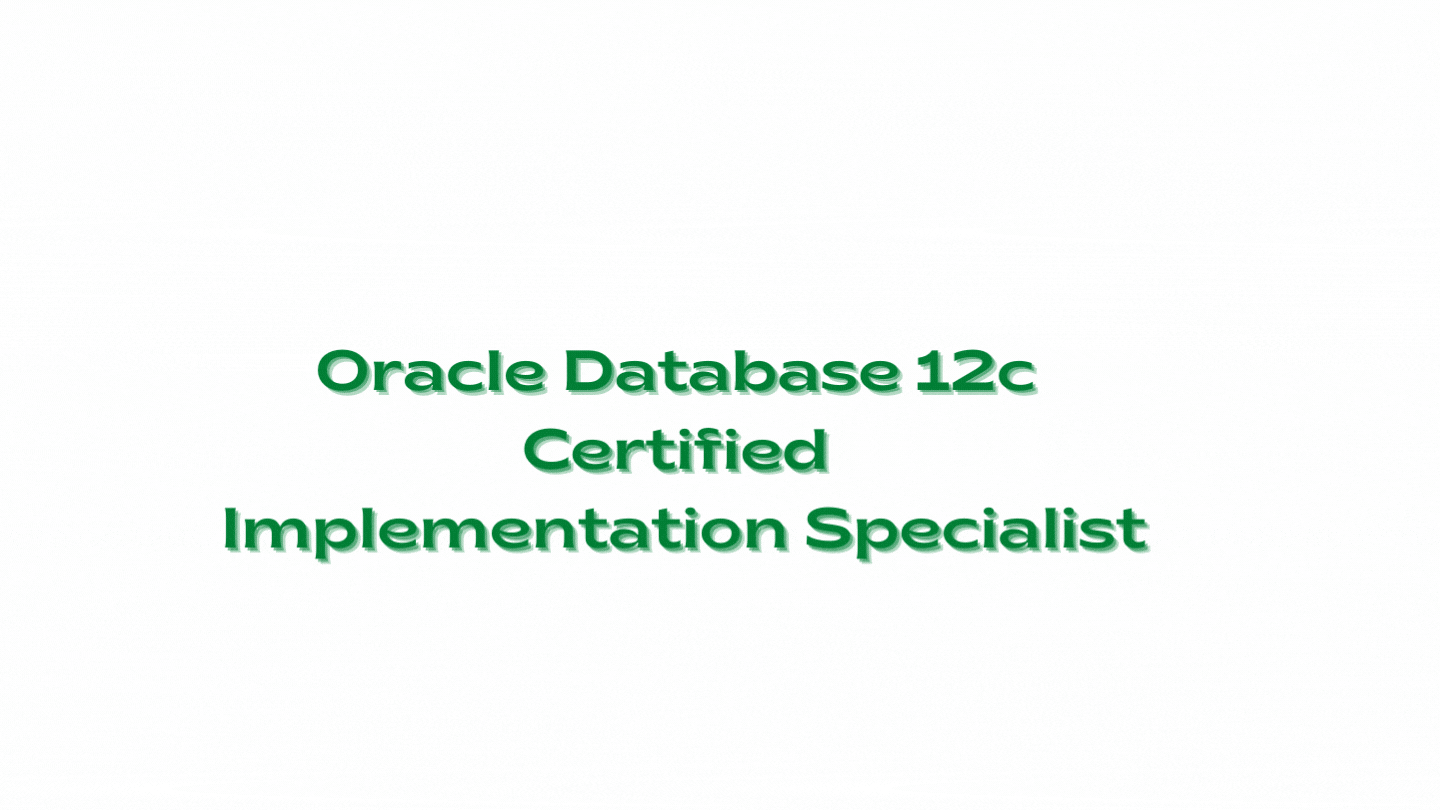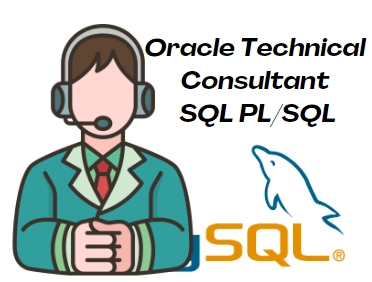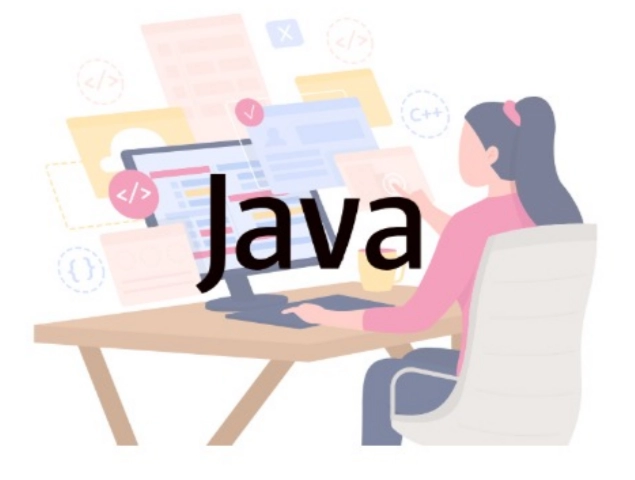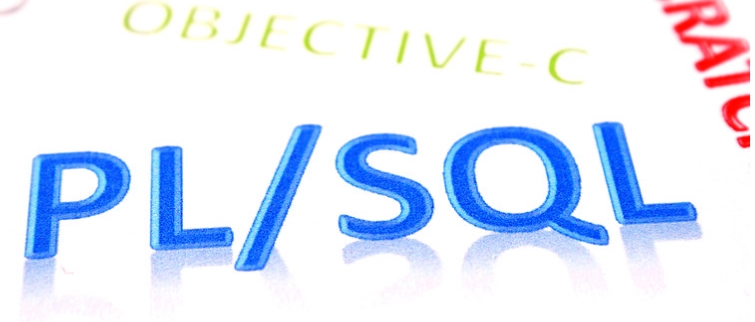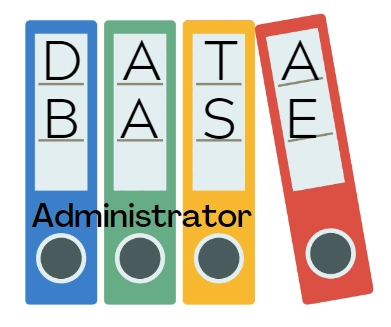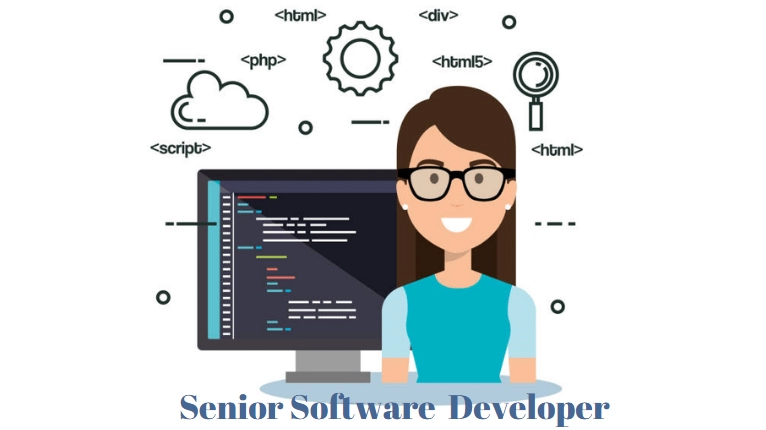Prerequisites

Candidate must have an in-depth knowledge of SQL, Oracle Database Software, Backup and Recovery, Schema Objects, Users and Security, Database storage structure, Oracle instance, Oracle Network Environment, Communication, Analysis, Database Administration, Troubleshooting, and configuring.
Preparation Plan for Oracle Database

To become an Oracle Database 12c Certified Implementation Specialist has to pass Oracle Database 12c Essentials 1Z0-497 examination.
For preparation to become an Oracle Database 12c Certified Implementation Specialist. One can complete any one of the below-mentioned courses (optional):
This course include Enterprise Manager Cloud Control, Detective Controls, New Oracle Database features, Database Firewall, Oracle Audit Vault, Exadata Database Machine
This workshop provides tools that enable us to view and manage database objects. Object Browser enables you to use tree control to view object properties and create new objects. The SQL Commands that enable you to enter ad-hoc SQL. Also, you will learn about Query Builder which enables you to create join queries using drag and drop.
This course will give you an in-depth understanding of concepts like Conditionally controlling code flow, Declare PL/SQL variables, Creating anonymous PL/SQL blocks, Handling runtime errors, and Using explicit cursors.
Helps you to understand the basic concepts of relational databases ensure refined code by developers, Manage schema objects, Run data manipulation statements, and Create reports of sorted and restricted data.
This workshop will teach you how to evaluate your own recovery requirements and help you to develop appropriate strategies for backup, restore, and recovery procedures from provided scenarios. Also, you will be introduced to Oracle Database Cloud Service in this workshop.
Important Exam Topics
- Oracle Database Software👩💻
- Describe key characteristics of a relational database
- Summarize locking behavior
- Differences between data concurrency and data consistency
- Various steps in database transaction
- Administration & Configuration
- Design database
- identify the requirements
- create the logical & physical design
- Install and configure the database
- Grant Enterprise Manager privileges
- Use SQL*Plus & SQL Developer to access the database
- Oracle Database 12c New Features
- Set up a GDS( Global Database Service)
- Define declarative policies for Data Redaction
-
Apply best practices for running the ADDM (Automatic Database Diagnostic Monitor)
- Maximum Availability Architecture
- Implementing various Data Guard configurations
- Explain architectural differences between Data Guard & Active Data Guard
- Implement the various replication options available
- Create an MAA (Maximum Availability Architecture) architecture that leverages Active Data Guard and Oracle Golden Gate
- Selecting appropriate high availability architecture based on planned and unplanned scenarios.
- Explain best practices & guidelines for backups
- Implementing recovery procedures for failure scenarios
- Use data Recovery Advisor for backup & recovery solutions.
- Administering Users and Security
- Creating and administrating users
- Granting privileges to users to perform database operations
- Create and manage roles
- Describe EM Cloud Control and EM Express architecture as it relates to the database.
- Using Oracle Enterprise Manager to view database storage structures.
- Apply different strategies to interact with the database using SQL Developer.
- Managing structures used to undo changes made to the database and maintain data consistency.
- Articulate relational database with various schema objects.
- Perform different index scans & relate them to their index types.
- Use the data dictionary and the dynamic performance views.
- Leverage partitioning in an Oracle database.
- Identify various tools for data movement and analysis.
- Software Installation and Maintenance
- Locate patches for the Oracle database.
- Apply troubleshooting tasks for planned database maintenance.
- Apply best practices to patching the database.
-
View & modify the parameters used to configure the Oracle instance.
- Articulate the various schema objects in a relational database.
- Perform different index scans and relate them to index types.
- Leverage partitioning in an Oracle database.
- Use the data dictionary and the dynamic performance views.
-
Identify the various tools for data movement and analysis.
- Oracle Multitenant Architecture
- benefits of the multitenant architecture.
- Create a pluggable database.
- Perform administration tasks on container database.
- Manage process in container database.
- Describe storage options for the pluggable database.
- Manage logical and physical structure of pluggable database.
- Difference between Container and Pluggable database.
- Oracle Database Instance Architecture
- Define the main components of the Oracle instance.
- Describe stages of instance.
- How a block of data is written into the database.
- Articulate various basic memory structures.
- Articulate the mandatory background processes.
- Describe how the block of data is written to the database.
- Oracle Network Architecture
- Describe the differences between Shared Server and Dedicated Server architecture as it relates to Oracle Connection Manager
- Describe the Oracle Database listener architecture
- Configure and connect to a database service
- Configure a database listener
After knowing all this thoroughly, one can easily register for this exam. The duration of the Oracle Database 12c Certified Implementation Specialist exam is 120 minutes consisting of 85 questions.
Resources for preparation

Please go through our well-structured resources below, which will help you prepare for the certification and ace it like a ninja! 🐱👤
Introduction to DBMS
MYSQL & PL/SQL
Normalization
Cloud Computing
Indexing in Databases
Frequently Asked Questions
Why is it essential to have a certification?
A high-value certification ensures that you keep your knowledge and skills up to date in your field. Certifications also demonstrate that you are dedicated to improving your knowledge and skills in your field.
What is the advantage of becoming an Oracle Database 12c Certified Implementation Specialist?
This certificate gives you an edge in the marketplace by proving your expertise in this field. 84% of the certified students see improvement in their job performance, and almost 70% improve their earning potential.
How can I check my result?
After 30 minutes of completing your exam, you will receive an email from Oracle regarding your exam result in CertView. Simply log in, if already authenticated, and then select the option “See My New Exam Result Now”. If not authenticated, you will need to proceed with account authentication. Authentication requires a Single Sign in with your username and password and Oracle Testing ID. You will be redirected to CertView to log in once authenticated.
What is the format, passing score, and price of this exam?
This exam contains 85 Multiple choice questions, which you have to attempt in 120 minutes. One needs to secure at least a 70% score to pass the exam. The exam price is ₹18,447.
Conclusion
In this article, we have extensively discussed Oracle Database 12c Certified Implementation Specialist. We hope that this blog has helped you enhance your Oracle Database 12c Certified Implementation Specialist knowledge. If you would like to learn more, check out our articles, Introduction to IT Certifications, Why Certification is Important for IT Professionals, and Introduction to Oracle Certifications.
Visit this page to apply for any Oracle Database 12c Certified Implementation Specialist job. Also, have a look at other software certifications.
Refer to our guided paths on Coding Ninjas Studio to learn more about DSA, Competitive Programming, interview experiences, database management systems, etc. Enroll in our courses and refer to the mock test and problems available. Take a look at the interview experiences and interview bundle for placement preparations.

Do upvote our blog to help other ninjas grow.
Happy Learning Ninja!🧡🙂
